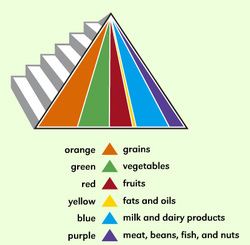
Do you ever get confused by nutrition news and fads? I've been studying nutrition for over seven years and practicing it clinically for several and I still sometimes get frustrated by dogmatic dieters and the crazy-making and contradictory nutrition stories that pervade our media.
It's enough to make almost anyone scream..."please, someone just tell me what to eat!"
Here's my philosophy: we are all unique. I do not believe in a one-size-fits-all approach for nutrition and diet. I don't believe that a vegetarian diet is good for everyone, but I believe it is appropriate and healthy for some people. This is just as I believe that some people absolutely need good quality animal protein in their diets. Usually it is not that any one or two foods are "bad," it's just that they are out of balance with others in the diet. Also, a particular food might not be the best for you but it is fine and even healthy for someone else. When helping patients with their diet, I find it is best to consider many factors. It is essential to not choose a diet based on what the media says is best, what the celebrities are currently eating or what your best friend swears by. It is best to find a diet that works for YOU. This is your own personal diet that promotes the best health possible for YOU and YOU alone. Keep reading below to learn more about the factors I consider when I help patients learn about their bodies and choose a diet that works for them.
There are some tried and true fundamentals to good nutrition. These principles should be present in every person's healthy diet. Some of these are:
- appropriate balance of macronutrients--fats, carbohydrates and protein
- sufficient micro-nutrients--vitamins, minerals, essential fatty acids (from fats) and amino acids (from protein)
- hydration
- lots of antioxidants and bioflavanoids from vegetables and fruits (not to mention fiber)
- whole-food, real-food, unprocessed food
- blood-sugar regulation
- low-inflammatory load
There are also health reasons one might choose a certain diet, such as:
- diabetes or hypoglycemia
- digestive problems
- cancer recovery
- autoimmune disease
- weight-loss
- allergies--food or environmental
- autism
- body-building
- chronic pain
There are also other factors when choosing a diet that's right for you:
- religious, cultural and spiritual considerations
- climatic and seasonal considerations (for example, a raw foods diet may be appropriate for someone in Miami, but not Alaska)
- a person's genetic inheritance and their blood type (there is evidence that different ethnic groups and blood types evolved to tolerate foods differently, making one person more predisposed to a certain diet or foods than another person)
- a person's metabolic type
- personal taste preferences for foods
- cost and budget
- food preparation time and effort
I will also add that is it helpful to be flexible about diet. Perhaps a diet that has worked for you for awhile (or even years) is no longer the correct diet for YOU. Or maybe the diet that comes highly recommended by some source for whatever condition you have really isn't the best one for YOU. Always be adaptable and flexible when needed.
There are many good types of whole foods diets out there. Even some of the popular new diets are nutritionally sounds, like the paleo diet. However, most people will still need to make modifications for their particular needs, while still following the foundations above for a healthy diet.
So you can see, diet and nutrition is a very personal matter. It is something for you to experiment with, and it can be helpful to work with a health practitioner that is both knowledgeable about different dietary approaches for different health conditions, and who will help you find the best diet to fit YOU. When working with you on diet I will always respect your dietary preferences and needs, while still educating you on options that might lead to more optimal health.

 RSS Feed
RSS Feed